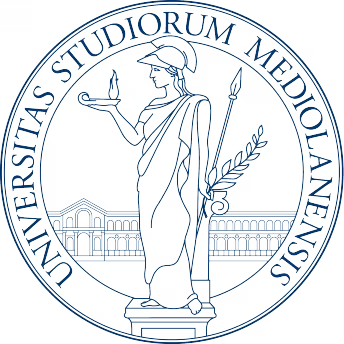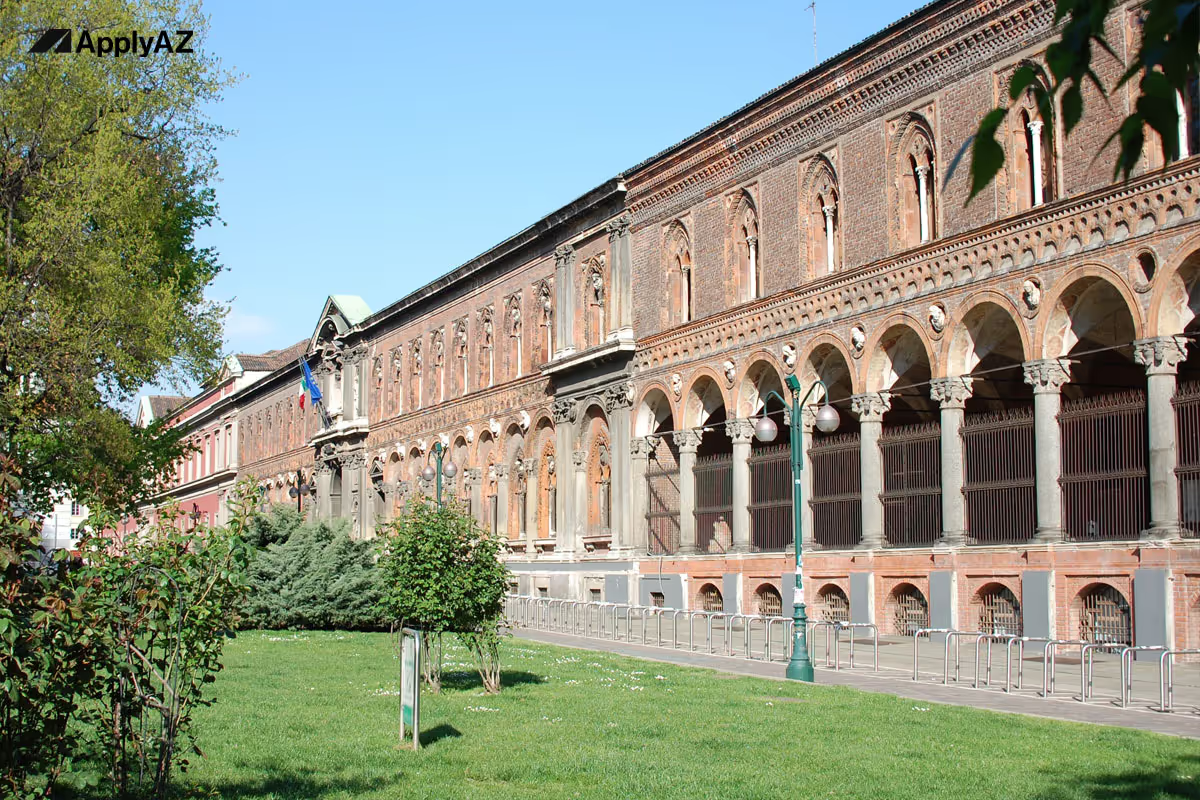Heading
Heading








University of Milan
English‑taught programs in Italy: breadth and quality
Founded in 1924, the University of Milan is a flagship among public Italian universities. It offers more than 15 full degrees entirely in English across life sciences, data science, economics, law, and the humanities. Small‑group seminars, modern laboratories, and research‑led teaching earn the university a consistent place in global top‑200 rankings for medicine, biology, and physics. Academic life blends lectures with project work and Erasmus+ exchanges, giving you both depth and international exposure.
Life in Milan: culture, costs, connections
Milan pairs Renaissance architecture with Europe’s fastest‑growing innovation district. Four metro lines, trams, and regional trains keep average commutes under 35 minutes, while student passes cut transport costs by half. Cafés stay open late for study sessions; world‑class music, design fairs, and football derbies fill weekends. Rents start around €400 per month in shared flats—pricey for Italy, but offset by campus dining at €4 per meal and the chance to share expenses with classmates.
Funding advantages: DSU grant and other support
As a state institution, Milan charges income‑linked tuition that ranges from €156 to roughly €3 000 per year. International students can apply for the DSU grant, which may waive tuition entirely and add a €7 000 living allowance, residence‑hall place, and meal vouchers. Merit scholarships reward top GPAs, and research assistant roles provide paid experience. With these tools, many graduates finish their master’s with little or no debt, mirroring the affordability of tuition‑free universities Italy promotes.
Career gateways in a global city
Milan is home to Italy’s stock exchange and to headquarters of companies such as IBM, Luxottica, and Nestlé. University partnerships cover more than 4 000 firms, feeding internships in finance, biotech, fashion tech, and AI start‑ups. Career Services run résumé labs, mock interviews, and on‑campus job fairs; 87 % of international graduates secure work or PhD places within seven months. Language tandems, alumni mentoring, and professional certification courses (Prince2, CFA Level I, Lean Six Sigma) further boost employability.
Five key takeaways
- Wide portfolio of English degrees backed by strong research.
- Dynamic metropolitan lifestyle with rich art and sport.
- Income‑based fees plus DSU grant make study highly affordable.
- Direct pipelines to internships and high‑growth careers.
- Supportive campus: libraries until midnight, 100+ clubs, free fitness classes.
In two minutes we’ll confirm whether you meet the basic entry rules for tuition‑free, English‑taught degrees in Italy. We’ll then quickly see if we still have space for you this month. If so, you’ll get a personalised offer. Accept it, and our experts hand‑craft a shortlist of majors that fit your grades, goals, and career plans. Upload your documents once; we submit every university and scholarship application, line up multiple admission letters, and guide you through the visa process—backed by our admission‑and‑scholarship guarantee.
Biotechnology for the Bioeconomy – LM‑7
English‑taught programs in Italy give future scientists a rare mix of strong academics, global classmates, and low tuition. By enrolling in Biotechnology for the Bioeconomy (LM‑7) at University of Milan (Università degli Studi di Milano)—one of the top public Italian universities—you explore how microbes, plants, and enzymes power the circular economy. Scholarships for international students in Italy, including the DSU grant, can reduce costs to levels often seen at tuition‑free universities Italy supports. If you want to study cutting‑edge biotech and sustainability in Europe, this degree is the perfect match.
Why Choose Biotechnology for the Bioeconomy?
Bioeconomy at the heart of green transition
The bioeconomy replaces fossil resources with renewable biological materials. From biodegradable plastics to biofuels and enzyme‑rich detergents, biotech innovations cut waste and carbon footprints. Governments and companies urgently need experts who turn labs into sustainable factories.
Study in Italy in English for science and culture
You learn advanced bioprocessing entirely in English, yet live in a country famous for research and heritage. This combination adds cultural flair to scientific studies—ideal for communicating with global partners.
Affordability and support
Public fees are moderate, and the DSU grant can cover tuition, housing, and meals. Extra merit scholarships reward top performers, making Italy one of the most cost‑effective study destinations in Europe.
Programme Structure
Duration
Two years, 120 ECTS, divided into four semesters. Coursework blends lectures, lab rotations, and an independent thesis.
Core pillars
- Molecular biotechnology – gene editing, synthetic biology, protein engineering.
- Industrial bioprocessing – fermenters, downstream purification, scale‑up design.
- Sustainable resource management – life‑cycle assessment, circular‑economy indicators.
- Business and policy – bio‑patents, EU regulations, green‑tech finance.
Year‑by‑Year Breakdown
Year 1: Building the scientific toolkit
- Advanced Microbial Genetics – CRISPR design, metabolic engineering.
- Enzyme Technology – kinetics, immobilisation, industrial catalysis.
- Bioeconomy Principles – market trends, value chains, and policy drivers.
- Analytical Methods – chromatography, mass spectrometry, bioinformatics basics.
- Research Skills Workshop – data handling, scientific writing, and lab safety.
Year 2: Applying biotech to industry
- Biorefinery Design – convert biomass into chemicals and energy.
- Waste‑to‑Value Technologies – upcycling food by‑products and agro‑residues.
- Regulatory Affairs and Bioethics – EU directives, intellectual property, public perception.
- Elective Cluster – choose environmental microbiology, plant biotechnology, or bioplastic formulation.
- Six‑month Thesis / Internship – original project in university labs or partner companies.
Learning Approach: Hands‑On and Industry‑Linked
- Pilot‑plant sessions – operate fermenters, monitor parameters, and collect data.
- Case studies – examine success stories such as yeast‑based leather or algae‑derived pigments.
- Group design challenges – propose circular solutions for packaging waste or bioenergy grids.
- Industry panels – meet R&D leaders from biotech firms, start‑ups, and venture funds.
- Field visits – tour bio‑refineries and enzyme production plants to see scale‑up in action.
Skills You Will Gain
- Lab proficiency – cloning, protein expression, and high‑throughput screening.
- Process engineering – translate bench protocols into 1 000‑litre reactors.
- Data analysis – interpret omics datasets, run statistical tests, create clear visuals.
- Sustainability metrics – conduct life‑cycle assessments and carbon accounting.
- Entrepreneurial mindset – draft tech‑transfer plans and pitch biotech solutions to investors.
Scholarships and the DSU Grant
DSU grant benefits
- Tuition waiver or reduction
- Accommodation or rent support
- Meal vouchers
- Book and transport subsidies
How to qualify
Provide family income documents, translated and legalised if required. Deadlines run mid‑year; ApplyAZ guides you through each step, increasing approval odds.
Additional funding
- Merit scholarships from the university
- EU Erasmus+ mobility stipends for thesis exchanges
- Private foundation awards for climate and circular‑economy research
Admission Steps
- Check prerequisites – bachelor’s in biotechnology, biology, chemistry, or related fields with strong lab background.
- Prove English level – IELTS, TOEFL, or equivalent (B2 minimum).
- Prepare documents – CV, transcripts, passport, motivation letter.
- Submit online application – university portal opens each spring.
- Interview (optional) – emphasise lab skills, sustainability interest, and project ideas.
- Apply for DSU grant – collect income certificates early.
- Secure visa – book embassy appointment; show funds and accommodation.
Life on Campus and Beyond
- Innovation hubs – join start‑up incubators focusing on bio‑based materials.
- Green student groups – organise workshops on zero‑waste labs and eco‑entrepreneurship.
- Language exchange – free Italian sessions help daily life; classes remain English.
- Career fairs – meet recruiters from biotech giants, agro‑tech firms, and EU agencies.
These experiences expand your network and enrich your cultural journey.
Study in Italy in English: Key Advantages Summarised
- Comprehensive training in both molecular science and sustainable business.
- Affordable pathway thanks to low public fees and scholarships for international students in Italy.
- Strategic location near EU bio‑cluster projects and green finance hubs.
- Global classroom that mirrors international workplaces.
- High employability across pharma, food, energy, and research sectors.
Ready for this programme?
If you qualify and we still have a spot this month, we’ll reserve your place with ApplyAZ. Our team will tailor a set of best-fit majors—including this course—and handle every form and deadline for you. One upload, many applications, guaranteed offers, DSU grant support, and visa coaching: that’s the ApplyAZ promise. Start now and secure your spot before this month’s intake fills up.

They Began right where you are










